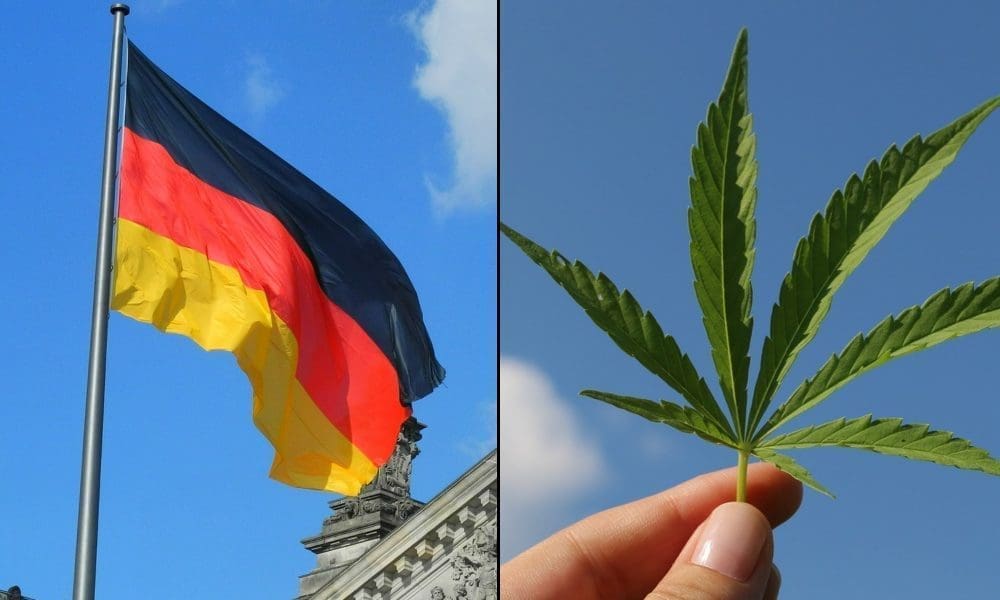featured
New German Medical Cannabis Restrictions Will Harm Patients And Hinder Industry Growth (Op-Ed)
Published
1 day agoon

“Despite significant and stable market growth, certain proposed policy changes that have been drafted may hinder industry progress and restrict patient access.”
By Niklas Kouparanis, Bloomwell Group
A new threat looms over the burgeoning medical cannabis market in Germany.
Recently, the German Health Ministry released a draft amendment that would require patients to have an in-person consultation annually and would bar prescriptions from being delivered by mail. While this is a draft and is likely to be changed during the legislative process, many are questioning the potential effects of policies like these on an otherwise growing and stable market.
Will this stall or even curtail future success?
Where the German medical cannabis market currently stands
Since the passage of the Cannabis Act (CanG) in April 2024, Germany has experienced significant growth in the country’s medical cannabis market due to cannabis being reclassified cannabis as a non-narcotic. This removed unnecessary administrative burdens on the medical cannabis market and allowed more patients to access the plant as a wellness treatment.
Prior to CanG being implemented last year, there were an estimated 200,000 to 300,000 medical cannabis patients in the German market. As of May 2025—just over one year after CanG went into effect—Whitney Economics estimates that there are now an additional 500,000 to 600,000 patients participating in the legalized self-paying market.
I predict that we could soon see a million patients if the market can grow under its current regulatory conditions.
As reported by the Federal Institute for Drugs and Medical Devices (BfArM), Germany imported over 37.223 metric tonnes of medical cannabis products in the first quarter of 2025. This number represents a noteworthy increase as the total imports for Q1 2025 increased by roughly 14.8 percent compared to the Q4 2024 total (32.419 metric tonnes). Compared to the same period a year prior, the Q1 2025 import numbers represent an increase of over 457 percent.
Proposed changes seek to put patient access at risk
Despite significant and stable market growth, certain proposed policy changes that have been drafted may hinder industry progress and restrict patient access.
In July 2025, the German Health Ministry released a draft amendment that would require patients to have an in-person consultation at a physician’s office or during a home visit once a year to be prescribed medical cannabis and also as a first step before starting their therapy.
In addition, medical cannabis treatments would no longer be able to be delivered by mail order. Patients would have to pick up their treatments at physical pharmacy locations.
Such legislative changes to current German cannabis law are led under the direction of Federal Health Minister Nina Warken, who is seeking to restrict patient access to medical cannabis. Warken has emphasized that record-high cannabis imports have increased beyond what was anticipated.
Report Reveals Digital Access Restrictions Would Push Patients to Illicit Market
According to German medical cannabis company Bloomwell Group’s latest report, “The Cannabis Barometer–Potential Consequences of Restricted Telemedicine Access,” which surveyed 2,500 medical cannabis patients in Germany, 41.7 percent of patients would revert to the illicit market if digital access were blocked.
Such findings suggest that digital access to licensed, physician-supervised cannabis therapy has successfully transitioned hundreds of thousands of patients away from unsafe, unregulated sources and into safe, pharmacy-distributed care.
Additionally, Bloomwell found that medical cannabis patient numbers show no signs of slowing down: In May and June 2025, the number of prescriptions filled on the company’s digital platform exceeded those from March 2024—the final month before medical cannabis was reclassified—by more than 1,100 percent, a new record high.
Other key findings from the Cannabis Barometer report included:
- Only 7 percent would consider joining one of Germany’s legal cannabis clubs, which mainly serve recreational users.
- Seventy-nine percent of patients previously relied on unlicensed sources (illegal market and/or through friends and acquaintances) before accessing digital therapy.
- Forty-seven and a half percent now say cannabis obtained from pharmacies is less expensive than unlicensed products, debunking myths about affordability. Only 13.8 percent responded that pharmacy cannabis is more expensive.
- Eighty-three percent believe medical cannabis from pharmacies is of higher quality than illicit alternatives.
Public and safety benefits of digital access
As mentioned, the passage of CanG allowed for further patient access to the legalized medical cannabis system. Such access prompted some individuals to shift from the illicit market to the regulated medical system, as they could now access prescribing physicians and treatments through digital platforms—signaling a significant harm reduction and an overall win for major public health.
Restricting digital access not only reverses this trend but also reintroduces substantial risks associated with unlicensed products, such as contamination, mislabeling and improper packaging that isn’t child-resistant.
Overlooked by critics of the legalized telemedical cannabis industry is that digital consultations for patients still involve licensed prescribing physicians, helping to ensure proper oversight and usage. Removing this channel simply undermines patient access without any apparent benefit.
Access equality for disabled and rural populations
Medical cannabis treatment is often prescribed to patients experiencing conditions that can vary in severity and may limit their mobility. Patients with chronic conditions, immunocompromised and disabilities can find it extremely difficult to travel to physicians’ offices for in-person consultations. The same issue applies to Germans living in rural areas.
These patients depend on digital consultations and mail-in orders to treat their medical conditions. Also, since there are a limited number of doctors in Germany who prescribe medical cannabis, many of these patients may be left without access and may have to turn to the illicit market.
Economic impact of restriction of access
The proposed policy changes not only pose harm to patients but also hinder the market’s growth. The German medical cannabis industry has demonstrated significant and stable development, generating job opportunities, tax revenue and investment opportunities. Regressive policies could slow or upend progress.
As mentioned in the Cannabis Barometer report, 41.7 percent of German medical cannabis patients stated that they would seek cannabis through illicit sources if their digital access were restricted. If that is the case, a large portion of economic activity would shift from regulated, taxable sales to the illicit market.
While we continue to consider these points, it’s important to remember that we are still at the beginning of the policy process and are hopeful that these changes are unlikely to be implemented. The German market will continue to thrive.
Niklas Kouparanis is CEO and co-founder of Bloomwell Group. Since 2017, he’s been a serial entrepreneur, medical cannabis pioneer, founder and growth activator of companies, all while shaping the future of the European cannabis industry.

Author: mscannabiz.com
MScannaBIZ for all you Mississippi Cannabis News and Information.
You may like
-


Cannabis & Psychedelics Reported Most Effective Non-Prescription Drugs by Eating Disorder Patients
-


Kentucky Governor Urges Trump To Oppose Bill Blocking Marijuana Rescheduling That’s Advancing In Congress
-


New York cannabis board approves 52 new licenses, pushes total to 1,851
-


South Park Loves Marijuana – The Fresh Toast
-


Lo Más Reciente de High Times en Español
-


DEA Judge Overseeing Cannabis Rescheduling Process Retires
featured
Cannabis & Psychedelics Reported Most Effective Non-Prescription Drugs by Eating Disorder Patients
Published
17 minutes agoon
July 25, 2025
An international survey of thousands of eating disorder patients found that respondents rated cannabis and psychedelics, including psilocybin and LSD, as the most effective non-prescription drugs for treating their symptoms.
The survey, conducted by University of Sydney researchers and published in JAMA Network Open, found that typical prescription drugs like antidepressants were not well-regarded by respondents. Additionally, respondents said the worst non-prescribed substances for treating their symptoms included alcohol, nicotine, and cocaine, although they are still widely used.
“Our results provide important insights into the lived experiences of people with eating disorders and their drug use, highlighting promising avenues for future research into treatments,” the lead researcher, Sarah-Catherine Rodan, a PhD student at the University of Sydney’s Lambert Initiative for Cannabinoid Therapeutics, said in a press release.
“This research suggests that cannabis and psychedelics hold significant promise for improving quality of life in individuals suffering eating disorders. This is particularly salient since current pharmacological options for these patients are severely limited and current treatment outcomes so disappointing. Of course, rigorous clinical trials are needed to confirm these benefits and better determine safety profiles.” — Professor Iain McGregor, the paper’s senior author and Academic Director of the Lambert Initiative, in a statement
The survey targeted 7,600 individuals across 83 countries. About two-thirds of the respondents were formally diagnosed with an eating disorder; the others “self-reported an eating disorder that caused distress.” Additionally, all major eating disorders were represented in the study, the researchers said, including anorexia nervosa (40%), bulimia nervosa (19%), binge-eating disorder (11%), and avoidant restrictive food intake disorder (ARFID) (9%).
“I hope this study gives a voice to people living with eating disorders, revealing that their often-stigmatised experiences with drugs might in fact have therapeutic potential,” Rodan said.

Author: mscannabiz.com
MScannaBIZ for all you Mississippi Cannabis News and Information.
featured
Kentucky Governor Urges Trump To Oppose Bill Blocking Marijuana Rescheduling That’s Advancing In Congress
Published
1 hour agoon
July 25, 2025
The governor of Kentucky is calling on President Donald Trump to reject congressional spending bill provisions that would prevent the Justice Department from rescheduling marijuana.
In a letter sent to Trump this week, Gov. Andy Beshear (D) emphasized that a pending proposal to move cannabis from Schedule I to Schedule III under the Controlled Substances Act (CSA) is something “you supported in your presidential campaign.”
“That process should be allowed to play out. Americans deserve leadership that won’t move the goalposts on them in the middle of the game,” Beshear said, noting that he was among the tens of thousands who submitted public comments in favor of the reform after it was initiated under the Biden administration, “demonstrating broad public interest in rescheduling.”
“I joined that effort because this is about helping people. Rescheduling would provide suffering patients the relief they need,” the governor said. “It would ensure communities are safer—because legal medical products reduce the illicit market. It would provide new, meaningful research on health benefits.”
Beshear also mentioned a letter to DEA he signed onto last year urging rescheduling, “because the jury is no longer out on marijuana. It has medical benefits.”
Rescheduling “is just common sense,” the governor said. “Over 40 states now have medical marijuana programs. Republicans and Democrats overwhelmingly agree on this issue, including in Kentucky, where you won a vast majority of the vote in 2016, 2020 and 2024, and where a Republican supermajority passed legislation legalizing medical marijuana in 2023—legislation that I signed into law. The federal government has fallen far behind on this issue and finally needs to catch up.”
Gov. Andy Beshear sent a letter to President Donald Trump this week asking the President to oppose congressional appropriations language that would block the DEA from rescheduling marijuana under the Controlled Substances Act.
Read more: https://t.co/TJj2fiTuxK pic.twitter.com/C1f63rkpYT
— Governor Andy Beshear (@GovAndyBeshear) July 25, 2025
He referenced a September 2024 comment from Trump where the then-candidate said that, under his administration, “we will continue to focus on research to unlock the medical uses of marijuana to a Schedule 3 drug, and work with Congress to pass common sense laws.”
“Now, it is time to make good on your promises to the American people.”
Referencing language included in a House committee-approved bill that would bar DOJ from rescheduling cannabis, Beshear said “this is not a common-sense law.”
“It stops a process that is already underway to accomplish a policy end that is overwhelmingly supported by the medical and scientific communities as well as the American people of every political party,” he said. “Congress should not take the decision-making process out of the hands of medical and scientific experts when they don’t like the results.”
“I hope that your action on this issue matches the promises you made to the American people to support rescheduling and work with Congress to ensure laws passed are truly ‘common sense,’” the governor said. “Again, I urge you to oppose the House Appropriations Committee’s proposed language to block the DEA from rescheduling marijuana.”
Here’s the text of the provision Beshear is asking the president to oppose:
“SEC. 607. None of the funds appropriated or other wise made available by this Act may be used to reschedule marijuana (as such term is defined in section 102 of the Controlled Substances Act (21 U.S.C. 802)) or to remove marijuana from the schedules established under section 202 of the Controlled Substances Act (21 U.S.C. 812).”
Regardless of the appropriations bill, the rescheduling process is currently sitting in limbo—especially since the DEA judge overseeing the process has now announced he’ll be retiring at the end of the month, leaving the issue to newly confirmed DEA Administrator Terrance Cole.
Notably, while Cole has said that examining the rescheduling proposal would be “one of my first priorities” if he was confirmed for the role, he has refused to say what he wants the result to be and has in the past made comments expressing concerns about the health effects of cannabis.
In May, a Senate committee advanced the nomination of Cole to become DEA administrator amid the ongoing review of the marijuana rescheduling proposal that he has so far refused to commit to enacting.
Cole—who has previously voiced concerns about the dangers of marijuana and linked its use to higher suicide risk among youth—said in response to senators’ written questions that he would “give the matter careful consideration after consulting with appropriate personnel within the Drug Enforcement Administration, familiarizing myself with the current status of the regulatory process, and reviewing all relevant information.”
Meanwhile, earlier this month, DEA again notified DEA Administrative Law Judge John Mulrooney that the marijuana rescheduling process remains stalled under the Trump administration.
It’s been six months since Mulrooney temporarily paused hearings on a proposal to move cannabis from Schedule I to Schedule III of the CSA that was initiated under the Biden administration. And in a joint report to the judge submitted on Monday, DEA attorneys and rescheduling proponents said they’re still at an impasse.
Beshear, meanwhile, has been focused on state-level cannabis reform developments over recent years.
He recently touted “another milestone” in the state’s forthcoming medical marijuana program, with a licensed cultivator producing “the first medical cannabis inventory in Kentucky history.”
The governor previewed the development late last month, stating that he expected to see medical marijuana growers “putting seed in the ground really soon,” while projecting that patients will have access to cannabis before the year’s end.

Author: mscannabiz.com
MScannaBIZ for all you Mississippi Cannabis News and Information.

The kids are foul mouth, opinionated, and always on point…and they love a little green plant
Since its debut in 1997, South Park has never shied away from taboo topics, and marijuana has been one of its most enduring themes. From early jokes about stoners to full-blown cannabis entrepreneurship, the evolution of weed in South Park mirrors shifting cultural attitudes—and reflects the creators’ own evolving stance.
RELATED: Why More Software Programmers Are Choosing To Smoke Weed
The show’s co-creators, Trey Parker and Matt Stone, are no strangers to controversy. But when it comes to cannabis, they’ve played both sides of the joint: poking fun at stoner culture while also embracing marijuana legalization as a symbol of personal freedom.
In the early seasons, cannabis was mostly a background gag. Randy Marsh, Stan’s dad, occasionally referenced drug use, but weed wasn’t a focal point. That changed dramatically in Season 23 with the introduction of Tegridy Farms—a fictional marijuana business Randy starts to recapture his lost sense of integrity (“tegridy”).

The Tegridy Farms storyline, which spans multiple seasons, is satire at its best: equal parts critique of corporate cannabis, commentary on the commodification of wellness, and a portrait of midlife crisis. As Randy evolves into a weed mogul, South Park explores everything from THC-infused products to international cannabis trade.
For Parker and Stone, Tegridy Farms is more than a plot device—it’s a reflection of how far cannabis has come in mainstream America. In interviews, both creators have acknowledged they support legalization and view the war on drugs as a failure. “We always thought it was ridiculous,” Stone said in a 2020 interview. “People getting locked up for something safer than alcohol? It never made sense.”
The irony, of course, is that South Park itself has grown up with its audience. Millennials who watched the show in middle school are now adults—many with mortgages, careers, and legal weed in their states. The cannabis storylines, once rebellious, now resonate as social satire for a generation navigating late-stage capitalism and ever-shifting norms.
RELATED: The Science Behind Why Music Sounds So Much Better When You’re High
South Park’s weed content also plays well with search engines. From “Tegridy Farms” memes to fan theories about Randy’s descent into madness, marijuana-themed episodes drive traffic and engagement. It’s smart business—and smart commentary.
Whether it’s lampooning hemp marketing or making fun of anti-pot hysteria, South Park keeps it blunt: weed is part of the culture now. And if there’s one thing Parker and Stone have always understood, it’s how to make culture laugh at itself.

Author: mscannabiz.com
MScannaBIZ for all you Mississippi Cannabis News and Information.

Cannabis & Psychedelics Reported Most Effective Non-Prescription Drugs by Eating Disorder Patients

Kentucky Governor Urges Trump To Oppose Bill Blocking Marijuana Rescheduling That’s Advancing In Congress

New York cannabis board approves 52 new licenses, pushes total to 1,851

South Park Loves Marijuana – The Fresh Toast

Lo Más Reciente de High Times en Español

DEA Judge Overseeing Cannabis Rescheduling Process Retires

GOP Senator Threatens To Block Spending Bill If Hemp THC Product Ban Stays In, Sources Say

The Best Delicious Summer Cocktails

The Race to Nowhere: How Chasing Potency Undermines Cannabis Quality (Opinion)

Weed & Psychedelics Are Doing for Eating Disorders What Big Pharma Couldn’t, Survey Says

Congressional Committee Pushes To ‘Eliminate’ Illegal Marijuana Grows And Tackle Money Laundering By Chinese-Linked Cannabis Operations

Supreme Court Will Discuss Ban On Marijuana Users’ Gun Ownership In September

Watch: £1m cannabis factory found in town’s old Woolworths store | News

Texas cannabis legalization bill filed in hemp-focused special session (Newsletter: July 25, 2025)

Mississippi AG takes aim at hemp products, including Delta THC | State

Judge overseeing cannabis rescheduling retires, leaving it to Trump’s DEA head (Newsletter: July 24, 2025)

Marijuana Use Has A Positive Impact On Consumers’ Careers, Poll Says

Single Dose Of Psilocybin Provided ‘Rapid Onset’ Relief Of OCD Symptoms, Study Finds

State lawmakers consider ban on THC products in Texas – NBC 5 Dallas-Fort Worth

Most Florida GOP Voters Oppose Marijuana Legalization Ballot Initiative, Poll Finds As Campaign Gathers Signatures

Vacant Erie County property to become industrial marijuana farm

Cypress Hill Honored for 30 Years of Cannabis Advocacy at California State Fair

Marijuana establishments pass $8B in gross sales in Massachusetts

Massachusetts Lawmakers Consider Competing Bills Around Boundaries Of Marijuana Advertising

Alert: Department of Cannabis Control updates data dashboards with full data for 2023

Connecticut Appoints The US’s First Cannabis Ombudsperson – Yes there is a pun in there and I’m Sure Erin Kirk Is Going To Hear It More Than Once!

5 best CBD creams of 2024 by Leafly

EU initiative begins bid to open access to psychedelic therapies

Free delta-9 gummies from Bay Smokes
New Study Analyzes the Effects of THCV, CBD on Weight Loss

5 best autoflower seed banks of 2024 by Leafly

May 2024 Leafly HighLight: Pink Runtz strain

Curaleaf Start Process Of Getting Their Claws Into The UK’s National Health System – With Former MP (Resigned Today 30/5/24) As The Front Man

Mississippi city official pleads guilty to selling fake CBD products

Discover New York’s dankest cannabis brands [September 2024]

Horn Lake denies cannabis dispensary request to allow sale of drug paraphernalia and Sunday sales | News

Press Release: CANNRA Calls for Farm Bill to Clarify Existing State Authority to Regulate Hemp Products

Local medical cannabis dispensary reacts to MSDH pulling Rapid Analytics License – WLBT

Nevada CCB to Accept Applications for Cannabis Establishments in White Pine County – “Only one cultivation and one production license will be awarded in White Pine County”

5 best THC drinks of 2024 by Leafly

The Daily Hit: October 2, 2024

6 best CBD gummies of 2024 by Leafly

5 best delta-9 THC gummies of 2024 by Leafly

Weekly Update: Monday, May 13, 2024 including, New Guide for Renewals & May Board meeting application deadline

People In This State Googled ‘Medical Marijuana’ The Most, Study Shows

PRESS RELEASE : Justice Department Submits Proposed Regulation to Reschedule Marijuana

Thailand: Pro-cannabis advocates rally ahead of the government’s plan to recriminalize the plant

Press Release: May 9, STIIIZY and Healing Urban Barrios hosted an Expungement Clinic & Second Chance Resource Fair
Trending
-

 California Cannabis Updates1 year ago
California Cannabis Updates1 year agoAlert: Department of Cannabis Control updates data dashboards with full data for 2023
-

 Breaking News1 year ago
Breaking News1 year agoConnecticut Appoints The US’s First Cannabis Ombudsperson – Yes there is a pun in there and I’m Sure Erin Kirk Is Going To Hear It More Than Once!
-

 best list12 months ago
best list12 months ago5 best CBD creams of 2024 by Leafly
-

 Business10 months ago
Business10 months agoEU initiative begins bid to open access to psychedelic therapies
-

 Bay Smokes1 year ago
Bay Smokes1 year agoFree delta-9 gummies from Bay Smokes
-

 cbd1 year ago
cbd1 year agoNew Study Analyzes the Effects of THCV, CBD on Weight Loss
-

 autoflower seeds10 months ago
autoflower seeds10 months ago5 best autoflower seed banks of 2024 by Leafly
-

 California1 year ago
California1 year agoMay 2024 Leafly HighLight: Pink Runtz strain

